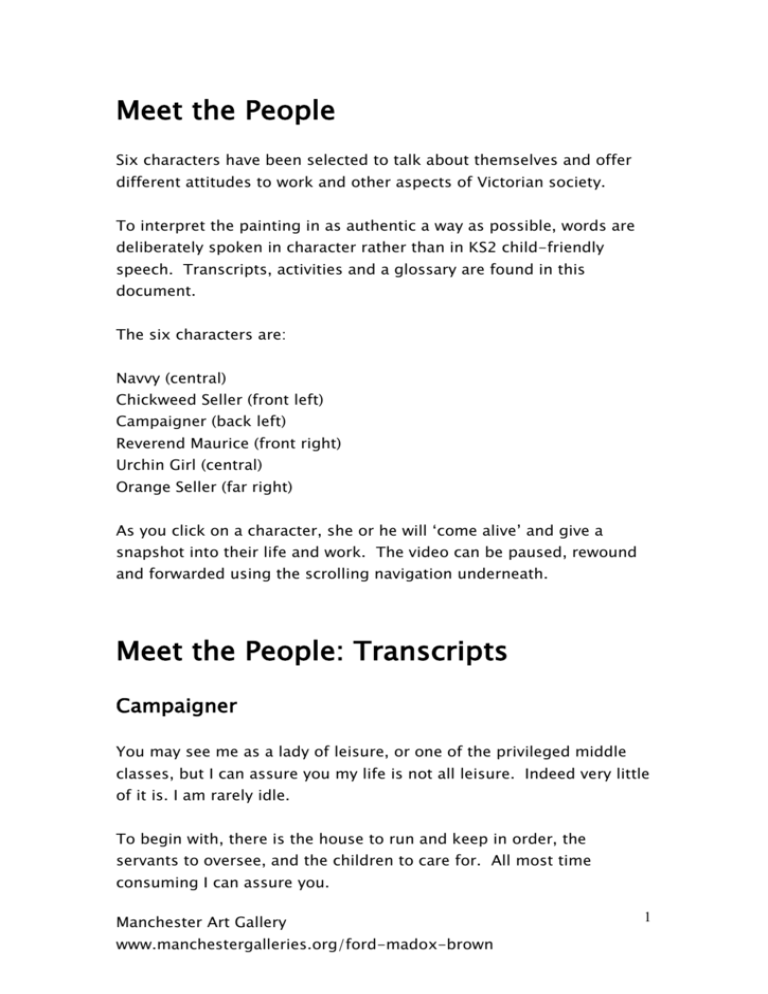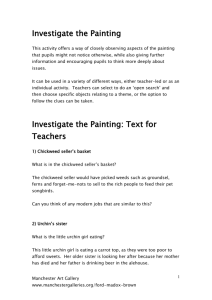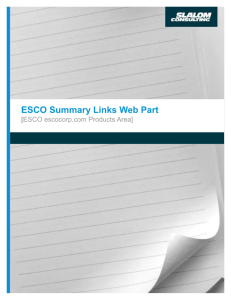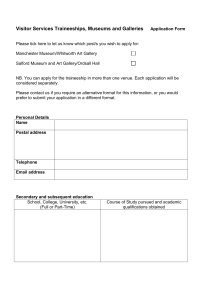Meet the people notes and a
advertisement

Meet the People Six characters have been selected to talk about themselves and offer different attitudes to work and other aspects of Victorian society. To interpret the painting in as authentic a way as possible, words are deliberately spoken in character rather than in KS2 child-friendly speech. Transcripts, activities and a glossary are found in this document. The six characters are: Navvy (central) Chickweed Seller (front left) Campaigner (back left) Reverend Maurice (front right) Urchin Girl (central) Orange Seller (far right) As you click on a character, she or he will ‘come alive’ and give a snapshot into their life and work. The video can be paused, rewound and forwarded using the scrolling navigation underneath. Meet the People: Transcripts Campaigner You may see me as a lady of leisure, or one of the privileged middle classes, but I can assure you my life is not all leisure. Indeed very little of it is. I am rarely idle. To begin with, there is the house to run and keep in order, the servants to oversee, and the children to care for. All most time consuming I can assure you. Manchester Art Gallery www.manchestergalleries.org/ford-madox-brown 1 And then there are my philanthropic duties, which I take most seriously and find very rewarding. I am an active supporter of the Temperance Movement, which is why I am here today, distributing these tracts and spreading the word about the evils of alcohol, the ‘demon drink’! The gin-shops and alehouses are the very curse of the working classes! The only answer is a pledge to abstain from all alcohol: complete teetotalism. It so happens we have a meeting this very night. So if you will excuse me, I must spread the word! Navvy Time for’t break. You won’t see me often idle. Did dawn ‘til dusk yesterday and will again. Got to get piece work done for’t butty gang. They call us ‘navvies’. Short for ‘navigators’. ‘Cos we build the railways and canals, see, inland navigations. But I’ve just finished a tramp and am glad of t’work, even pipe laying. Thou needs water pipes in this town, no word of a lie. I ain’t seen nowt like the smoke and stink in this city and I’ve been mooching all the way from London to Glasgow. ‘Til them pipes is laid, thou will’t best drink beer, thou knows. My wife died of cholera - and I ain’t about to do the same. Ey up. Time for’t blow up. Best get digging. Hagman on this shift’ll use his fists sooner than ask, and I ain’t about to toe the line with him. Reverend Frederick Maurice Manchester Art Gallery www.manchestergalleries.org/ford-madox-brown 2 Hello. I am the Reverend Maurice. You know, as a Priest and as a Professor of Theology, I have learned one important thing in life. Never judge by appearances! Sometimes the man you see sitting in despair by the roadside is not lazy, not idle, not unwilling to work. Perhaps, if he enjoyed the advantages that I enjoy, and, I hope you enjoy too, perhaps then he could have learnt to read, to better himself. After all, the great George Stevenson, that inventor of that emblem of modernity, the steam train, was a poor working class man who, by helping himself, came to be rich, famous, a leading member of society. That is why I founded the Working Man’s College a little while back, in 1854. I wanted enthusiastic working class men (and women – I created a college for women too) to have the same education as we, the middle classes. Moreover, the tuition at the Working Men’s College is the finest in the country. I teach there myself and my esteemed friends the painters Ford Maddox Brown and Dante Gabriel Rossetti have also contributed to this virtuous project. Chickweed Seller Before dawn. Before dawn best. Best to be in the fields at dawn. Find the plants, find the healthy ones, then back into town. Best before the girls. You know what they says...Who's he to? Why doesn't he? They understands a little one selling. I take the money back to mother. She takes in washing. She’s always washing, washing, always washing. What’s she going to do when she gets old? Manchester Art Gallery www.manchestergalleries.org/ford-madox-brown 3 Bad men say, ‘’Ere, give us an ‘and. You're slim. You can get through little windows. Get the jewels and out.’ Mother told me about them, so I say no, and I smile. You gotta smile. Watercress for your table! Chickweed for the birds! I gets tired by about three and the plants wilt. Throw them in the river. Nap under the bridges. Orange Seller In truth I’ve had nothing but trouble from the Peelers since I came here. Did you see the shove that that one there gave me, just for resting my basket on the post there? Says I was ‘causing an obstruction’, but I notice he didn’t move any of them others on. I live by selling fruit on the street. ‘Tis a poor living when I see how others live, but it’s thankful I am to live at all in these sore times. I had to leave Ireland, because of the famine. Me mother and father couldn’t keep me. Well, they couldn’t keep themselves, and so I came to this country. I’ve walked miles already today. I’ve only made thruppence and tuppence of that is for my night’s lodging. Urchin Girl Oi, stop that, or I’ll give your hair a tug! I will! Manchester Art Gallery www.manchestergalleries.org/ford-madox-brown 4 That’s me brother, he’s always causing trouble. Look at him now. He won’t leave that workman’s barrow alone. And there’s not just him to keep me eye on, there’s me little sister, and the baby too. Well, I’ve got to look after them all since me mother died. Oh yeah, me father’s still alive, but we hardly sees him. He’s always in the alehouse, drinking. Well, he drinks because he’s sad, but because he drinks we ain’t got no money for food, nor clothes. Sometimes people gives us things, ‘cause we’re poor. They call us ‘urchins’. But a kind lady give me this rag to wear. Ooh, ooh, it’s nearly lunchtime innit? Ooh, I better hurry because there’s this woman what lives nearby - she knew my mother. She works in the kitchens in one of them rich people’s homes, and sometimes she gives us scraps from the table. Ooh, and I don’t want to miss them. I better go. Hurry up you two! Meet the People: General Activities Literacy/History: Listen to each character in turn. Use the glossary to identify and explain any confusing or new words and phrases. History/Citizenship: Which character would you most like to be and why? History/Citizenship: Which character do you think works the hardest and why? History/Citizenship: Which character do you think works the least hard and why? History/Citizenship: Why is each of the characters in the city at this time? Where might they have come from or be going to? Manchester Art Gallery www.manchestergalleries.org/ford-madox-brown 5 Literacy: Choose one of the characters and write ‘A Day in the Life’ of that character. Art: Draw your chosen character at work. Literacy/Drama/Citizenship: Work with a partner to devise a conversation that might have taken place between any two different characters. How do they react towards each other? Character specific activities Navvy Drama: Work in groups to create freeze-frames of navvies during different stages of the day. Recreate the navvies in Work and photograph yourselves in position. Citizenship: Which jobs today do you think are similar to the work of a navvy? Art: Create a modern day navvy scene. Drama/Literacy: Imagine you are a navvy and that you have just finished a hard day’s work and are now relaxing in the alehouse. What might you say about your day at work? Citizenship: Imagine you are a member of the butty gang. Write your own set of rules for the gang. Think about the importance of working together in a team. Citizenship: Work in teams to build a bridge out of newspaper, sellotape and straws. Think about the different jobs people will have to do when working together. Whose team can make the best bridge? D&T: Make a packed lunch to carry to work in your tommy bag. What might you have to eat during the day? Music: Navvies often sang songs while they worked. Can you find any examples of these Victorian songs? Manchester Art Gallery www.manchestergalleries.org/ford-madox-brown 6 Chickweed Seller Literacy: Describe this character – what is he like as a person? Citizenship: Do you like this character? Why or why not? Citizenship: Do you think the Chickweed Seller is working hard? Explain why or why not? History/Literacy: In Victorian times, different plants, herbs and flowers had different symbolic meanings. Can you find out what different plants symbolised? History/Citizenship: Chickweed was used as food for the songbirds belonging to rich people. Can you find any other types of pet in this painting? Can you tell whether they belong to rich people or poor people? How can you tell? Campaigner History/Citizenship: Do you think the campaigner is a lady of leisure or is she working hard? Explain your answer. History/Citizenship/RE: Research the Temperance Movement. Find out about Joseph Rowntree or Thomas Cook who were both famous members of the Temperance Society. Citizenship/ICT/Art: Make your own campaign leaflet for a cause that you believe in (perhaps it could be about the environment, or an anti-smoking campaign) Citizenship: Notice that the campaigner has a young child with her. What do you think about this? Do you think this child is better off than the urchin children at the front? Give reasons for your answer. Reverend Maurice History: Reverend Maurice was a real person who actually existed. See if you can find out more about his life and the Working Men’s College that he set up (which still exists today). Citizenship: Ford Madox Brown calls Maurice a ‘brainworker’ because he worked by using his brain or intelligence to think Manchester Art Gallery www.manchestergalleries.org/ford-madox-brown 7 about the plight of the poor, and help them better themselves through education. Do you think that this counts as hard work? History: The person standing with Reverend Maurice is called William Carlyle. He was also a real person. Can you find out more about him? RE/Citizenship: Reverend Maurice worked to improve the lives of those less well-off because he believed that all people were equal under God’s eyes. Do you know of any other Victorians who worked to make the world better because of their beliefs? (Florence Nightingale, Mary Seacole, John Cadbury) Urchin Girl Art/D&T: Make an outfit from scraps of old clothes. How would you feel if you actually had to wear this every day? Citizenship: Do you have younger brothers and sisters? Imagine what it would feel like to have to look after them all the time. Drama: Imagine that the urchins are trying to find their next meal. Devise a short sketch about how they do this. History: Find out about the lives of rich children in Victorian times. What was it like to go to school? Compare the life of a rich child with that of a poor one. Literacy: Write a diary entry or a poem about how it feels to be an urchin child. Orange Seller History: This orange seller is being moved on by a policeman or ‘peeler’. Research the founder of the Police Force, Sir Robert Peel. How are today’s policemen similar and different to Victorian policemen? History/ICT: The orange seller is an immigrant escaping from the potato famine in Ireland. Find out more about the potato famine and put together a PowerPoint presentation on what you have discovered. Manchester Art Gallery www.manchestergalleries.org/ford-madox-brown 8 Drama/Citizenship: Fill a large basket with oranges and see how long you can carry it without getting tired. Do you think that the orange seller was working hard? Meet the People: Glossary This glossary explains, in chronological order, words spoken by the different characters in the Meet the People section of the interactive. Reverend Maurice Reverend A reverend is the title given to a clergyman or vicar in the Church. Priest A priest is a minister in the Church. Professor of Theology A professor of theology is an intellectual who studies and teaches religion (theology) in universities. Unwilling Unwilling means not wanting to do something. George Stephenson George Stevenson was born in 1781, and died in 1848. He built the first railways that could carry steam trains and was highly regarded by the Victorians for being a pioneer of the railways. Working Man’s College Reverend Maurice established a Working Men’s College for young men to receive an education in the liberal arts. He was the first principal Manchester Art Gallery www.manchestergalleries.org/ford-madox-brown 9 there in 1854, and the college was one of the first places of adult education in the country. Tuition This is another word for teaching. Esteemed friends To esteem somebody means that you value and have high regard for him or her. Ford Madox Brown Ford Madox Brown is the artist who painted Work. He was born in 1821 and died in 1893. Dante Gabriel Rossetti Dante Gabriel Rossetti was an artist, poet and translator, and a founder of the Pre-Raphaelite movement. He was born in 1828 and died in 1882. Manchester Art Gallery www.manchestergalleries.org/ford-madox-brown 10 Campaigner Lady of leisure A ‘lady of leisure’ is the phrase often used to describe a woman who does not have a paid job, usually because she is wealthy and has no need for work, or because she has retired. In this case, the campaigner would have been married to a wealthy gentleman, and so did not need to earn money. However, she does see herself as a busy woman with an important unpaid job to do. Philanthropic duties The word ‘philanthropic’ means ‘kindness to people’ and comes from the Greek language. Philanthropists were generous people who may have given money or time to help people less well off than themselves. The campaigner sees her ‘philanthropic duties’ as her campaign or duty to stop people from drinking alcohol. Temperance Movement The movement against drinking alcohol was called the ‘Temperance Movement’. People could join the Temperance Society if they thought it was wrong to drink alcohol. Tracts A tract is another word for a leaflet or pamphlet, often trying to encourage people to do something. The campaigner here is giving out tracts or leaflets that encouraged people to give up drinking alcohol. Gin-shops A gin-shop was the place where Victorians could buy cheap alcoholic spirits, such as gin. The campaigner would have thought that these places were the root of all evil. Ale-houses An alehouse, tavern or inn, was a place where people could buy and drink beer, like today’s pubs. The campaigner would have thought these places were the root of all evil. It would be very unusual for a wealthy woman like her to go into an alehouse. Manchester Art Gallery www.manchestergalleries.org/ford-madox-brown 11 Pledge A pledge is a solemn promise. In the case, the campaigner was encouraging people to pledge that they would not drink alcohol. Abstain To abstain from something means to give it up. The campaigner was trying to encourage people to abstain from drinking alcohol. Tee-totalism Tee-totalism is the word used to describe the act of giving up drinking alcohol. Manchester Art Gallery www.manchestergalleries.org/ford-madox-brown 12 Navvy Idle Not working, or lazy. Piece work Wages for the navvies could be earned in two ways: either payment by the hour, or payment by the amount, or ‘piece’, of work done. Piece work would have been done by a group of navvies (a butty gang) for a fixed price, and was therefore a better way of earning money. Butty gang A butty gang was a group of ‘buddies’ who were the best navvies, and had learnt that working in a gang or team was better than working as an individual. Butty gangs only ever did piece work, knowing they could earn more money by getting the job done quickly, or by negotiating a good price. They shared the wages equally amongst themselves. Navvy The word Navvy was first used for people who worked to improve the waterways or canals, which were also known as ‘navigations’. Navvy was the shortened slang word for ‘navigator’. Navigation A navigation was any type of inland navigation such as canal and railways, and later clean water pipes and sewage systems. Navigations were dug and built by the navvies. Tramp Navvies walked from place to place and job to job, and this was known as being ‘on tramp’. Manchester Art Gallery www.manchestergalleries.org/ford-madox-brown 13 Mooching This was a word used for begging, door to door, by men such as navies ‘on tramp’. They would sometimes offer to do odd jobs in return for food. Cholera An infectious disease carried in dirty water that killed tens of thousands of people during the Victorian period. Blow-up This was the bell to tell people to start work again after a break, especially at the start of the day. Hagman A hagman was another type of workman, often a navvy with bigger fists than the others, and with a tendency to be dishonest. Urchin Ale-house An alehouse, tavern or inn, was a place where people could buy and drink beer, like today’s pubs. The urchin girl’s father would probably have spent most of his time in the alehouse. Urchin An urchin is a street-child or ragged child who may have been an orphan. Urchins often had to look after younger brothers and sisters, begging or stealing food to survive. Orange Seller Peelers Peelers was one name given to the police force. They were named after the founder Robert Peel. This name is also where another word for policeman comes: ‘bobby’. Manchester Art Gallery www.manchestergalleries.org/ford-madox-brown 14 Famine A famine is when there is extremely little food. The famine here would have been the Irish Potato famine of 1845 – 1849. Potatoes were the main crop grown for food, but the famine was caused by blight, a disease of potatoes. Immigrants would have come over to England from Ireland to escape the famine and find work during this period. Over one million people in Ireland died of starvation during the potato famine. Thruppence This was three old pennies, or 3d and would have been a silver coin. Tuppence Two old pennies, or 2d. Lodging A lodging is the place where the orange seller would have stayed at night, such as a boarding house or a room in an inn. Manchester Art Gallery www.manchestergalleries.org/ford-madox-brown 15







